VITA
The unconditional wish for autonomy, the clear vision to be permanently independent of others as early as possible, runs like a golden thread through Werner Otto’s life.
Werner Otto, born in 1909 in Seelow (Margraviate of Brandenburg), was already as a boy strong-minded and assertive. He had a sheltered upbringing in a middle-class family, who in the moved to Prenzlau. The boy experienced his father, the grocer Wilhelm Otto, as mild man who obviously lacked the toughness a business man needs from time to time. As adolescent he rather followed the nature of family Mühlbach – his mother’s relatives. Werner Otto’s mother died in 1910 shortly after she gave birth to a daughter. He got on very well with his stepmother, who his father married after the mourning, and the three later born half siblings. Werner Otto spent great years on the Mühlenbach farm. The daily contact to animals and plants influenced his love for nature for ever; his uncle’s autonomy and the independent work appealed to him.
Already at an early age, Werner Otto knew that he had to find a profession in which he can work independently – everything else was unimaginable. Meanwhile, dark shadows had fallen on the life of the Otto family, just as on that of million others. The First World War ended with a devastating defeat for Germany and the country’s economy needed years to regain its stride. In the course of the inflation, Wilhelm Otto’s grocery store went bankrupt and Werner Otto had to leave the secondary school as his parents couldn’t afford the school fee anymore. At this time, the boy dabbled in writing – his idols were Balzac and Hamsun. He completed two novels up to ready-to-print stage, but then, nonetheless, put them away. The serious side of life had finally been entered and Werner Otto started his three-year apprenticeship as merchant. Afterwards, he opened his own small shop in Szczecin. The political and social crises of the 1920s coined him as much as his apprenticeship did.
Werner Otto turned into an attentive, politically thinking person who recognized that it was not enough to rely on the state alone. At the same time he became aware that only absolute customer orientation, sense of purpose, and clever business strategies ensure the position of a successful company in the long term. He chose his motto that he has taken into account until today and that has given him strength over and over again: "Panta rhei" – everything flows.
In 1934, Werner Otto, who by then was operating a successful cigarette store near the Alexanderplatz square in Berlin, was arrested. He smuggled anti-Hitler leaflets to Germany via the Czech border and was sentenced to two years in the Plötzensee prison. After his release, Otto moved with his wife Eva to Kulm an der Weichsel and his children Ingvild and Michael were born. The relocation was kind of an escape, Otto wanted to avoid the permanent observation in Berlin. In the end, he had to go to war. He had to serve at the front where he was seriously injured. He experienced the end of the war with a severe head injury in a hospital.
1945 – Zero hour in Germany. Werner Otto and his family struggled their way to the west. Otto – just as thousand others – had hit rock bottom but kept his chin up. “You can fall down – but you must get up again” – a phrase Werner Otto quoted again and again.
Despite the most difficult conditions he started right away to establish contacts and to open up new fields of business in the Hamburg region. At first, Otto opened a small shoe manufactory in Hamburg, which he had to close down again after the elimination of the sector borders and the thus associated strengthening of competitors. Rather accidentally, he read about the mail order business that was being developed – something that fascinated him immediately. On August 17, 1949, four days after his 40th birthday Otto registered his new mail order business at the Hamburg State Ministry of Economy and Transport.
His headquarters had been two barracks in Hamburg-Schnelsen and also the sales channels were rather simple. The first catalogue was hand-bound, had only 14 pages and was issued in a print-run of 300 copies. The delivery was partially realized by bike. But already after a short period of time it became clear that Werner Otto had backed the right horse. In 1951, the print-run comprised 1500 catalogues and the company already had a turnover of one million German marks. Additional buildings were needed in Schnelsen, the number of employees rose to 150 by 1952.
In 1956, Werner Otto relocated the strongly expanding “Otto Versand” to larger buildings in Hamburg-Hamm. One year later his father Wilhelm died and his son Frank was born after he celebrated his second marriage in 1952. Shortly afterwards they were moving again. In 1959, the foundation stone was laid for the new headquarters in Hamburg-Bramfeld, in 1961 the company was moving in – until today this is the place of the headquarters of the global Otto Group. 17-hour days were no rarity for Werner Otto in those days, but the rule. Nonetheless, apart from his strategic goals Otto never forgot the welfare of his employees and proved to be a social, responsible employer. Already in 1956, he introduced the 5-day working week as one of the first entrepreneurs in Germany. Early 1957, a welfare fund for allowances, old-age, disabled and survivors’ pensions was created for employees. In 1962, Werner Otto temporarily sold parts of his company in order to increase the capital base for planned expansions – among others to E. Brost & J. Funke, owners of the Essen-based WAZ group. One year later he married his third wife Maren – the children Katharina and Alexander were born.
The early years demanded enormous achievements from the entrepreneur and his team, and Otto had to face difficulties that are hardly imaginable today. Advertising, for example, was still in its infancy and it was hardly possible to find qualified specialists. The expanding company continuously had to be kept technically up-to-date, and machines and computers that had just been introduced were replaced within a very short period with new ones that were much more efficient. The work was worth it and Werner Otto was able to outpace his competitors and gained a leading position.
Werner Otto, who as entrepreneur always attached greatest importance on not getting tangled up with details, avoided the cardinal error many founding entrepreneurs made: to consider himself as indispensable in the daily business and to interfere in too many details. Instead he focused in all business fields on the establishment of a highly qualified management that was able to act independently and autonomously.
In the course of the more than 60 years long corporate history, the former Otto Versand became the Otto Group and the worldwide largest mail order group.Represented in 19 countries in Europe, America, and Asia, for decades it has been one of the most expansionary and at the same time most profitable groups of the industry.
In 1981, he handed over the management of the Otto company to his son Dr. Michael Otto, who in 2007 changed as chairman to the Supervisory Board.
"Share and grow" is one of the twelve corporate principles defined by Werner Otto and to which he heeded during all of his professional life. Accordingly, he started early in expanding the range of his activities and to invest in other countries. Already in the early 1960s, he intensively informed himself about urbanization and urban development and finally ventured – back then, globalization was not yet talked about – a leap across the Atlantic to Canada. With the help of a highly specialized management, he developed industry parks as well as residential and office buildings – mainly in the Toronto region. The real estate group “Park Property” founded by him today manages more than 8,000 apartments as well as approx. 150,000 square meters of commercial space. It is thus one of the largest companies of its kind in Canada.
As of 1973, he started the establishment of an US-American real estate group in New York, the Paramount Group, which includes among others building complexes in New York and Washington.
When Werner Otto was in his late fifties he didn’t think about retiring but decided to start all over again. He checked different options before he opted for a new field of action: he already got to know the expanding shopping center market in the USA and now he was tempted to try something similar in Germany. In 1965 he founded the “Werner Otto Vermögensverwaltungs GmbH” which was later turned into “KG Einkaufs-Center-Entwicklungs G.m.b.H. & Co”. In 1979, the company was given its final name: “ECE Projektmanagement”, which Otto designed in terms of economy and personnel completely independent of the Otto Versand. Within only a few years ECE became one of the most important development, construction and management companies for shopping centers in Europe. ECE develops and constructs also office buildings, special properties and other commercial projects, always with the aim to effectively contribute to the development of city centers as well as the careful revitalization of cities. In 2000, Werner Otto’s son Alexander became CEO of ECE.
Werner Otto is one of the very few still living trade pioneers, who characterized the economy, who had considerable influence on the Federal Republic’s economic, socio-political and social development due to their visionary power, distinctive inventiveness, and entrepreneurial courage in the last 60 years.
He is one of the entrepreneurs from the early days, whose business empires founded and established shortly after the currency reform acquired worldwide reputation and whose companies don’t only bear their names but that are even today fundamentally shaped by the founding family.
Werner Otto’s major focus was always on his entrepreneurial work, never his person. For nearly 50 years he is happily married to his wife Maren, who ceaselessly supports him in his charitable commitment. He has a harmonic relationship to his five children Ingvild, Michael, Frank, Katharina, and Alexander – all very successful in their different fields of action and all happy family people. Apart from family and health he considers the independent entrepreneur’s possibilities of creative work as his greatest source of happiness. “Those who are thinking statically and who don’t take a step forward for fear of making mistakes shouldn’t become entrepreneurs,” is Otto’s conviction.
"Panta rhei" – everything flows.
On August 13, 2009, Werner Otto celebrated his 100th birthday.
"Fortune may reach out to you, but success is what you have to see to yourself"
Those and other pictures can be downloaded » here
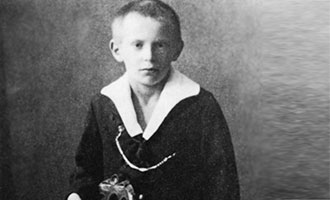
Werner Otto aged 10.
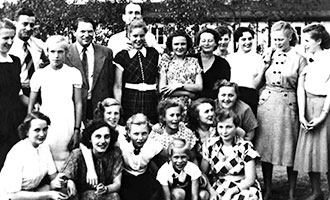
Werner Otto (fourth from the left) with his staff 1952.
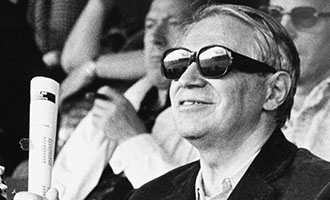
Werner Otto in the early 1980s at a game of the Hamburger Sportverein (HSV).
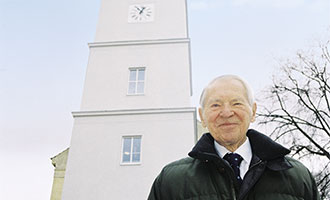
Werner Otto in November 1997 in front of his redeveloped baptistery. He donated the money for the reconstruction.
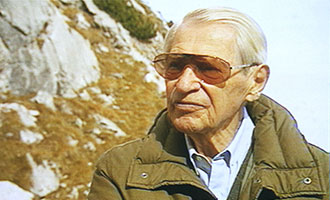
The 89-year-old Werner Otto during a hike.
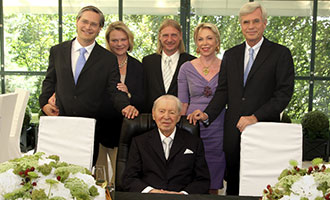
13.08.2009: 100th birthday of Werner Otto.
Werner Otto with his children Alexander Otto, Katharina Otto-Bernstein, Frank Otto, Ingvild Goetz, and Michael Otto (r.)
Those and other pictures can be downloaded » here